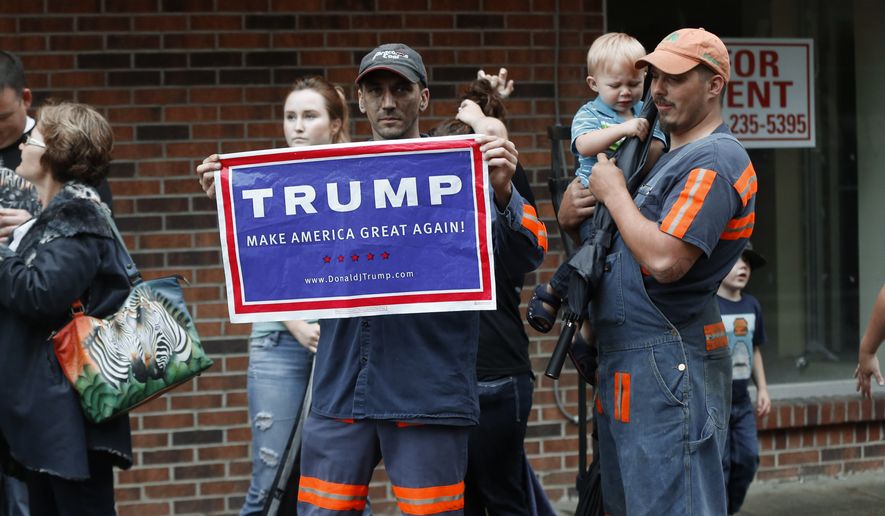In March, Hillary Clinton told a town hall in central Ohio that she was going to put a lot of coal miners “out of business.” Weeks later, she was telling a laid-off coal worker in West Virginia that she had made a “misstatement.”
Now her comments are being used against her in Ohio, Pennsylvania, West Virginia and other parts of coal country and the nation’s manufacturing heartland — just one example of how a local matter can turn into an outsized issue on the campaign trail.
It’s not a problem just for Democrats.
Republican presidential nominee Donald Trump got tripped up by his varying positions on North Carolina’s law regulating the use of public bathrooms based on gender identity. Mr. Trump initially said people should be able to pick the bathroom they prefer, then hours later said states should be able to set their own rules, as North Carolina’s Republicans had done.
Gay rights groups now say Mr. Trump has squandered a chance to reach out to their community thanks to his evolving bathroom stance. Even if it wins support in conservative communities, it will dent his chances elsewhere, in places where the social conservative causes just don’t play as well.
Missteps on economic or social issues can be inevitable given the frenetic schedule of presidential campaigning and the need to tailor messages to specific audiences in key swing states.
“Running for president means you’re really running nine gubernatorial campaigns at once, and there’s no way given the varied regions of the country that you are going to be perfect-sounding in every region,” said Republican strategist Ford O’Connell.
Local issues play particularly outsized roles during the primaries, when campaigns fight state by state and candidates try to show they are familiar with issues on voters’ minds. Federal land use policy looms large in swing states Nevada and Colorado, while port construction funding and federal pay rates are much bigger issues in Virginia.
In Iowa, home of the caucuses that kick off each primary season, subsidies for corn-based ethanol are perennially a major issue. In New Hampshire, the second state on the primary schedule, candidates were putting more focus this year on the dangers of the nation’s opioid addiction crisis. As the campaign heads to Florida and Alabama, candidates begin to talk about NASA funding, which plays an economic role in Orlando and Huntsville areas.
Mr. Trump is a political newcomer, but he has proved a quick learner about the value of localizing his pitches.
“We’re going to keep that space program going, folks,” Mr. Trump said at a rally in Alabama right before the March 1 primaries. “We’ll be doing a lot of cutting, but when it comes to that, I have to tell you — we’re going to be keeping it going.”
But where his economic pitches have appeared to work, Mr. Trump has had a rougher time with social issues as he appears to try to please both sides.
As the bathroom choice issue was heating up, he initially thrilled gay rights activists by saying transgender patrons should be able to use whatever facility they choose. Later, though, he said states should be able to set rules — taking back his outreach to the gay community.
“Over and over, he has shown himself to be unqualified as a presidential candidate and no friend to gay and transgender people,” said Equality NC Executive Director Chris Sgro.
Tami Fitzgerald, executive director of the North Carolina Values Coalition, said her group was concerned about the initial comments but that she has no doubt Mr. Trump is with the coalition. She said the Republican presidential nominee would benefit by talking about the transgender bathroom issue when he is campaigning in the state, where he was Thursday.
“He’s right — it should be a matter of state law,” Ms. Fitzgerald said. “So I think we’re in tune with him.”
Though Mr. Trump has tripped on social issues, Mrs. Clinton’s biggest stumble was on economics. She tried to appease her environmentalist supporters but ended up angering working-class white voters, who used to be part of the Democratic base.
Speaking about her energy policy at a town hall in Columbus, Ohio, in March, Mrs. Clinton said, “We’re going to put a lot of coal miners and coal companies out of business and we’re going to make it clear that we don’t want to forget those people.”
Mrs. Clinton later said it was a misstatement taken out of context, but Republicans aren’t letting her forget about it.
“People remember what Hillary Clinton said, and they’re certainly not going to forget it before November,” said Brittany Warner, communications director for the Ohio Republican Party. “The comment that she made was something that was not forgettable and not forgivable, and her trying to say later that she spoke after seeing how politically damaging that was for her was not something that was going to be helpful.”
Mr. O’Connell said the gaffe was particularly damaging because it tied back to Mrs. Clinton’s reversals of her positions on trade — an issue central to the campaigns of Mr. Trump and Democratic primary candidate Bernard Sanders — and that the remedy she continues to offer isn’t much comfort for those who are struggling to look for work or keep jobs.
• David Sherfinski can be reached at dsherfinski@washingtontimes.com.




Please read our comment policy before commenting.